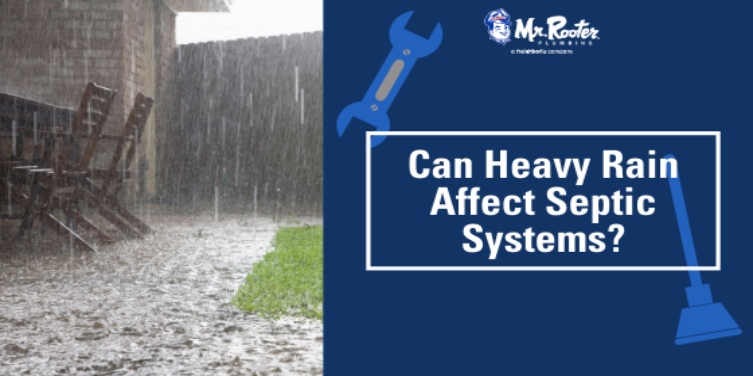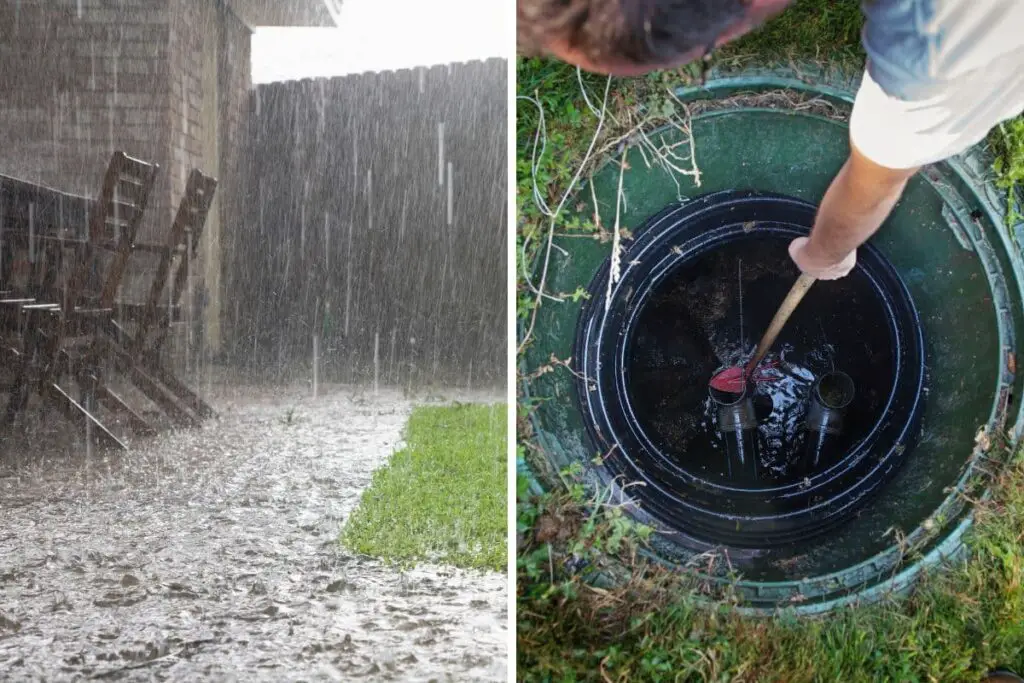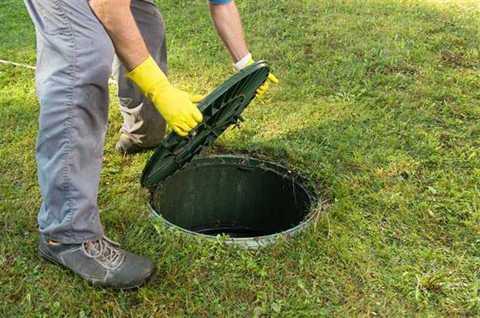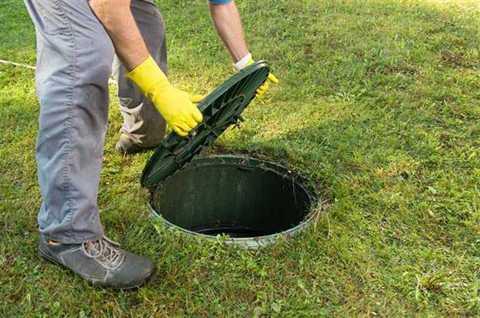Imagine waking up to a rainy morning, hearing the pitter-patter of raindrops against your window. While rain can be soothing, it also brings about concerns, especially if you have a septic tank. In this article, we will explore the relationship between heavy rain and septic tank backups, shedding light on whether the former can truly cause the latter. So, grab a cup of your favorite warm beverage and let’s dive into the world of septic tanks and rainfall!

Causes of Septic Tank Backup
Insufficient Drain Field
An insufficient drain field is one of the leading causes of septic tank backup. A drain field, also known as a leach field, is responsible for filtering and dispersing the wastewater that flows out of the septic tank. When the drain field becomes insufficient, it means that it cannot adequately handle the amount of wastewater being discharged. This can lead to an accumulation of wastewater in the tank, which eventually results in a backup. An insufficient drain field can occur due to a variety of reasons, including improper installation, soil compaction, or a small drain field size in relation to the household’s water usage.
Excessive Water Usage
Excessive water usage is another common cause of septic tank backup, especially during heavy rain. When heavy rainfall occurs, it adds an extra burden on the septic system as more water enters the system than it can efficiently handle. If the household is already using excessive amounts of water, compounded with heavy rain, it can overwhelm the septic system, leading to a backup. Activities such as long showers, frequent laundry, or constantly running toilets can contribute to excessive water usage and put additional strain on the septic system.
Faulty Septic Tank Design
Septic tank backup can also be attributed to a faulty septic tank design. If the design does not include appropriate features such as a sufficient number of baffles or tees, it can impede the flow of wastewater and contribute to backups. Additionally, if the septic tank is not properly sized for the household’s water usage, it may quickly reach its capacity during heavy rain or periods of increased water usage. A faulty design can prevent the efficient separation of solids from liquids, leading to clogs and backups within the system.
Clogged Pipes
Clogged pipes are a common culprits of septic tank backup. Over time, debris, grease, and other substances can accumulate in the pipes leading to and from the septic tank, obstructing the smooth flow of wastewater. When heavy rain occurs, it can exacerbate the issue by flushing additional debris into the already clogged pipes. This can result in a backup as the wastewater cannot flow freely through the system. Regular maintenance and proper disposal of waste can help prevent pipe clogs and reduce the chances of septic tank backup.

Effect of Heavy Rain on Septic Systems
Increase in Water Level
One of the primary effects of heavy rain on septic systems is the significant increase in water levels. As rainwater saturates the ground, it can seep into the septic tank, raising the water level within it. This increased water level can put excessive pressure on the tank and potentially cause it to overflow or backup into the household plumbing system. To prevent this, it is crucial to ensure that the septic tank is properly maintained and emptied regularly to accommodate the extra water during heavy rain events.
Saturated Drain Field
Heavy rain can also lead to a saturated drain field, which can further exacerbate septic tank backups. When the soil in the drain field becomes oversaturated, it can no longer effectively absorb and filter the wastewater from the septic tank. As a result, the wastewater may remain stagnant in the drain field, contributing to backups and potential sewage overflow. Adequate landscaping, such as avoiding compacted soil and ensuring proper grading, can help mitigate the impact of heavy rain on the drain field.
Soil Erosion around Tank
Another effect of heavy rain on septic systems is the potential for soil erosion around the septic tank. As rainwater pours down, it can cause the surrounding soil to erode or wash away. This erosion can compromise the integrity of the tank, leading to cracks or leaks. If the septic tank becomes damaged, it can allow groundwater to infiltrate the tank, overwhelming the system and resulting in backups. Regular inspection and maintenance can help identify any signs of erosion and prevent further damage to the septic system.
Overloading of the System
Lastly, heavy rain can overload the septic system, especially if there is already a pre-existing issue or the system is not adequately sized for the household’s water usage. The additional water from heavy rain events can surpass the system’s capacity to process and treat the wastewater efficiently. This overload can lead to backups, foul odors, and even sewage backups into the house. It is essential to be mindful of water usage during heavy rain and consider implementing preventive measures to alleviate stress on the septic system.
Preventive Measures for Heavy Rain
Regular Maintenance
Regular maintenance is vital to ensure the proper functioning of the septic system, especially during heavy rain events. Schedule routine inspections by a professional septic tank service provider to check for any signs of damage or potential issues. Regular pumping of the septic tank is also crucial to prevent backups, as it removes accumulated sludge and scum that can impede the system’s efficiency.
Proper Landscaping
Proper landscaping plays a crucial role in preventing septic system backups during heavy rain. Ensure that the area around the septic tank and drain field is properly graded to divert surface water away from the system. Avoid planting deep-rooted trees or shrubs near the septic system, as their roots can infiltrate the tank and pipes, causing potential damage. Well-maintained grass cover and shallow-rooted plantings can help absorb excess rainwater and minimize soil erosion.
Rainwater Diversion
Diverting rainwater away from the septic system can significantly reduce the strain on the system during heavy rain events. Make sure that gutters and downspouts are directed away from the drain field area to prevent excess water from infiltrating the system. Additionally, consider installing rainwater collection systems to capture and store rainwater for other purposes, reducing the amount of water entering the septic system.
Conservative Water Usage
Conservative water usage is essential to prevent septic tank backups during heavy rain. Be mindful of activities that consume a significant amount of water, such as extended showers, running the dishwasher frequently, or excessive laundry. Implement water-saving practices such as using low-flow fixtures, repairing leaks promptly, and spacing out water-intensive tasks to reduce the overall strain on the septic system.

What to Do If Backup Occurs
Contact Professional for Inspection
If a septic tank backup occurs, it is crucial to contact a professional septic tank service provider for inspection. They have the expertise and tools to diagnose the issue and recommend the most appropriate course of action. Avoid attempting to resolve the problem yourself, as it could potentially worsen the situation or cause further damage to the septic system.
Avoid Using Plumbing Fixtures
To prevent further backups and potential damage to the septic system, it is essential to avoid using any plumbing fixtures until the issue has been resolved. Limiting water usage during this time can help alleviate the strain on the system and prevent sewage backups into the house. It is advisable to use alternative facilities or limit water usage for essential needs only until the septic system is functioning properly again.
Pump the Septic Tank
In some cases of septic tank backup, pumping the tank may be necessary to remove the accumulated wastewater and alleviate the backup. A professional septic tank service provider can assess the situation and determine if pumping is required. Regular pumping, even during normal circumstances, can help prevent backups and maintain the optimal functioning of the septic system.
Repair or Replace Damaged Components
If the septic system experiences backups due to damaged components, such as pipes, fittings, or the septic tank itself, it may be necessary to repair or replace these components. A professional septic tank service provider can assess the extent of the damage and propose the most suitable solution. Prompt repairs or replacements can prevent further backups and ensure the long-term functionality of the septic system.
In conclusion, heavy rain can indeed cause septic tank backup, but by understanding the underlying causes and implementing preventive measures, you can minimize the risk and protect your septic system. Regular maintenance, proper landscaping, rainwater diversion, and conservative water usage are all essential practices to ensure the optimal functioning of your septic system during heavy rain events. If a backup does occur, it is crucial to contact a professional for inspection and follow their recommendations for resolving the issue. With proactive care and attention, you can keep your septic system running smoothly, even in the face of heavy rain.

